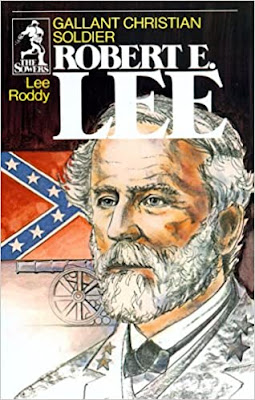
|
Yesterday, a book that caught my eye at the Richardson ISD Council of PTAs Used Book Fair sent me down the rabbit hole in search of the real Robert E. Lee. It's been said that the South lost the shooting war, but won the PR war. Lee's reputation was burnished after the Civil War by advocates of the Lost Cause. Yesterday's book review was of Lee Roddy's 1977 book "Gallant Christian Soldier: Robert E. Lee", an example of the genre that was still going strong a century after Lee's death. Personally, I had long ago rid myself of any belief that slave owner Robert E. Lee had a flawless character, as Roddy maintained in his biography of Lee. But I was still willing to grant that Lee was a masterful strategist and tactician on the battlefield. Today, my explorations down the Lee rabbit hole rid me of that belief as well.
Lee is being criticized as a military strategist on two fronts. One is his consistent objective of defending his home state of Virginia, and in particular, its capital, Richmond. The other was his repeated attempts to wage offensive war by invading the North, first in Maryland, and then in Pennsylvania at Gettysburg.
One critic says the South could have won the Civil War by not losing, whereas the North could only have won by winning. That suggests the better strategy for the South would have been to retreat from Richmond, and certainly not to wage offensive warfare in the North. The strategy should have been to draw the Union armies away from their own supply lines and into a stalemate in inhospitable terrain deep in the South's mountains and forests and swamps. But that wasn't the strategy Lee adopted. He fought the North on its own terms, and even on its own terrain, where the North's superiority in manpower and munitions would inevitably lead to victory.
Other military historians criticize Lee's tactics, most disastrously for the South at Gettysburg, where Lee ordered the fateful Pickett's Charge against the advice of his aides and without clear reconnaissance of what he was facing. The myth-makers have tried to blame Lee's subordinate James Longstreet for being slow to attack. I'll let the military historians carry on this argument. Personally, I now understand that Lee's military genius, which I had thought was universally acknowledged, has now been challenged.

No comments:
Post a Comment